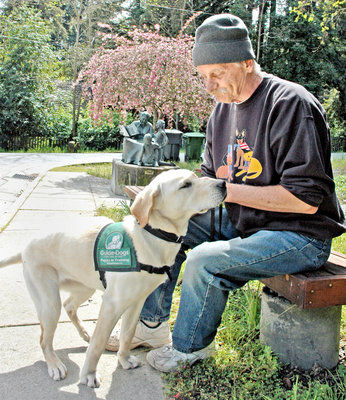
Puppy-raiser John Czaja takes Nikita, a young yellow Labrador retriever, with him wherever he goes, including the mall, the library, Costco and the airport.
The big-pawed, floppy-eared pup has paramount expectations for her future: Czaja is prepping her to be a guide dog for the blind.
“The basic idea is that we take them everywhere we can, so once they start working they will be used to handling all the commotion,” he said. “They need to get used to distractions.”
Czaja, of Boulder Creek, has raised service dog-hopefuls for six years through Guide Dogs for the Blind, a nonprofit started out of Los Gatos in 1942.
Guide Dogs for the Blind volunteers raise yellow and black Labradors, golden retrievers and crossbreeds of the two as guides.
The puppies are born at Guide Dogs kennels and given to volunteer raisers at about 2 months old. The raisers typically get one puppy a year to housetrain, give basic obedience training and socialize to new experiences.
The puppies are returned to the nonprofit for formal training when they are between 14 and 18 months old. Those puppies that make it to graduation are matched with blind owners who have also received training on how to adapt to life with a guide dog.
“It’s all in the nose,” Czaja said. “Their noses are so advanced — they can even be trained to detect an imbalance in the brain that gives off a scent, which means they can predict when someone is about to go into a seizure.”
Dogs can also learn to detect if a person’s blood sugar is imbalanced, Czaja said.
Czaja said that of the different types of service dogs, being a guide dog is the most demanding.
“They ask a lot of these dogs. Most of them don’t make it,” he said. “My last dog, Nessie, was my fifth dog, and she was the first one I had that made it to graduation.
“If they’re not perfect, they won’t be put into guide service — but you have to have hope.”
To make it through graduation, each puppy must show its ability to not get spooked or distracted, urinate and defecate on command, and promptly return to its owner whenever it’s needed.
“The dog has to recall on command. You can’t play hide-and-seek with a blind person,” Czaja explained.
The candidates that don’t make through guide dog training are “career-changed” to other professions. Of Czaja’s past puppies, most were adopted, while others went on to be breeders, something that’s not uncommon with the guide dogs that don’t quite complete training.
“Some become search-and-rescue. During the recent Haiti earthquake, this dog Cadillac, who was career-changed, saved a bunch of victims,” Czaja said.
He said he got involved with Guide Dogs, which has graduated more than 10,000 pups, after seeing an ad in the paper. He had recently lost his beloved canine companion and wasn’t ready to commit to adopting a new dog.
Czaja said the Guide Dogs ad seemed like a perfect solution.
“I wanted to do something noble and meet some nice people, and I did. I’ve met some of the most caring people through this organization,” Czaja said. “It’s one of the best things that’s ever happened to me in my life.”
At a glance
• For information: 800-295-4050 or www.guidedogs.com












